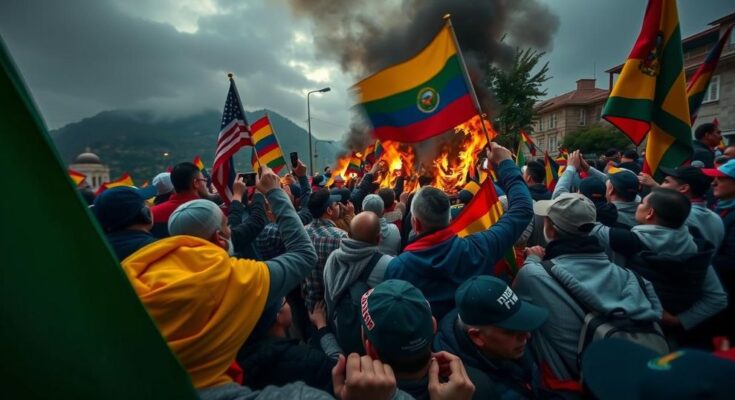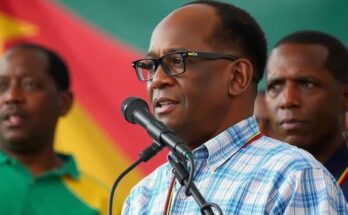Bolivia is in turmoil due to a power struggle between President Luis Arce and former President Evo Morales, resulting in widespread protests and blockades. Morales’ influence has waned significantly amidst challenges from the government and internal divisions within MAS. Consequently, opposition parties may gain leverage as the nation prepares for the 2025 elections. However, the next administration will face considerable economic issues and potential public unrest.
LA PAZ — Bolivia finds itself engulfed in a significant political power struggle between President Luis Arce and former President Evo Morales, a conflict within the ruling Movimiento al Socialismo (MAS) party that has intensified national tensions. The country recently experienced extensive protests, including prolonged road blockades affecting main transport routes, violent confrontations with law enforcement, and an attempted occupation of military posts. Morales has accused Arce of complicity in an alleged assassination attempt against him, claims that the government vehemently denies. As Morales endeavors to regain influence over the MAS, the long-standing leader faces a notable decline in his political capital. His leadership, once dominant since the 1990s, is now under severe challenge as Bolivia approaches the next elections in August 2025. Morales’s influence has diminished—this is apparent in the waning popularity he has faced since allegations of election fraud led to his resignation in 2019. Following a tumultuous transitional period exacerbated by the COVID-19 pandemic, Luis Arce—Morales’ former finance minister—took office in 2020. Upon Morales’s return from exile, a rift developed between the two men, which has increasingly strained their prior alliance into a fierce rivalry. The recent protests have further illustrated Morales’ weakening position within Bolivian politics. With government forces successfully dismantling major blockades, the extent of Morales’s political prowess appears to have dwindled. His response to escalating discontent has included a hunger strike aimed at negotiating economic recovery measures and addressing his legal challenges—namely, denouncing his disqualification from the upcoming elections and allegations of serious misconduct. Despite initial fervor, Morales’s inability to secure his demands has resulted in a backlash against him, alienating essential support from key demographics. The current turmoil presents a pronounced opportunity for opposition parties, as internal divisions within MAS and Luis Arce’s faltering approval ratings may embolden both liberal and conservative factions. If these forces successfully unify, they could potentially seize political control in the forthcoming elections, a shift not experienced in twenty years. However, any new administration will confront numerous obstacles, including devastating economic challenges and a deep-seated crisis in environmental management. Many observers suggest that immediate economic reforms, such as currency devaluation and adjustments in fuel pricing, will be necessary yet politically explosive decisions that could provoke significant unrest. Given Bolivia’s historical context of rapid civil protest, prospective reforms appear daunting. Nevertheless, the disarray within MAS and the decline of Morales’ leadership could signal a transformative moment for Bolivian democracy, prompting necessary judicial reform and addressing pressing environmental concerns.
The political landscape in Bolivia has been tumultuous, shaped by the rivalry between President Luis Arce and former President Evo Morales. Morales, who once dominated Bolivian politics for 14 years, is facing a decline in influence due to revelations of internal party conflict and discontent among traditional supporters. The backdrop to this struggle includes significant allegations of electoral malpractice that led to Morales’s resignation in 2019 and the subsequent return of the MAS party to power in 2020. The ongoing resistance against government policies and Morales’ attempt to reclaim influence set the stage for potential shifts in the political milieu as the country approaches the 2025 elections.
In conclusion, the power struggle between President Luis Arce and former President Evo Morales within MAS has led to significant unrest in Bolivia, highlighting Morales’ declining power. As political fractions form in anticipation of the upcoming elections, the opposition may find an opportunity to reclaim a foothold in Bolivian governance. Despite the economic difficulties that await any incoming leadership, the current political turmoil could initiate a new chapter in Bolivia’s democratic processes, emphasizing the need for reform and responsive governance.
Original Source: www.americasquarterly.org



